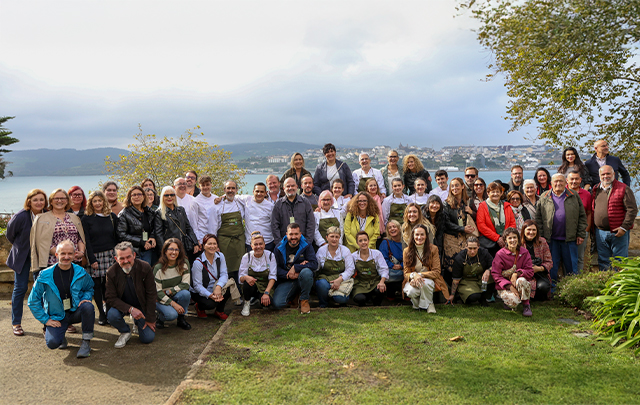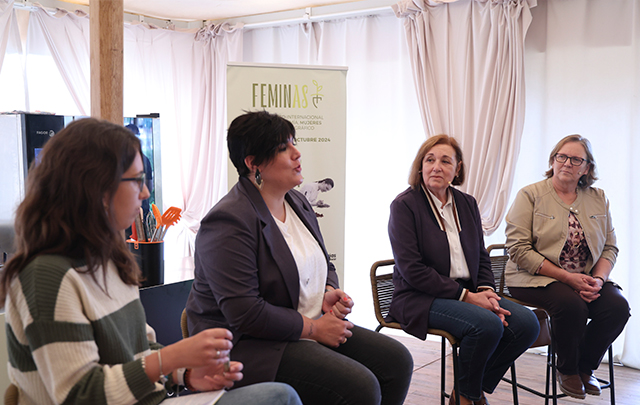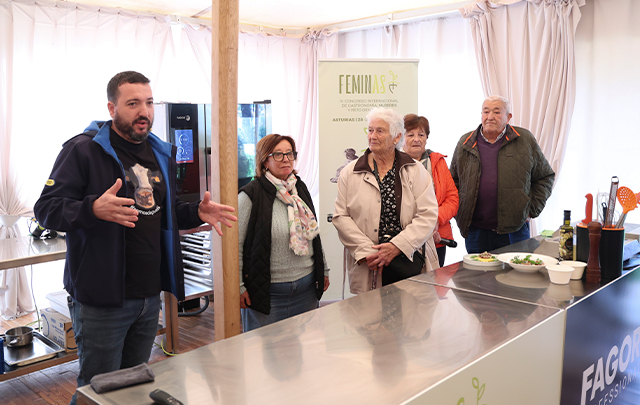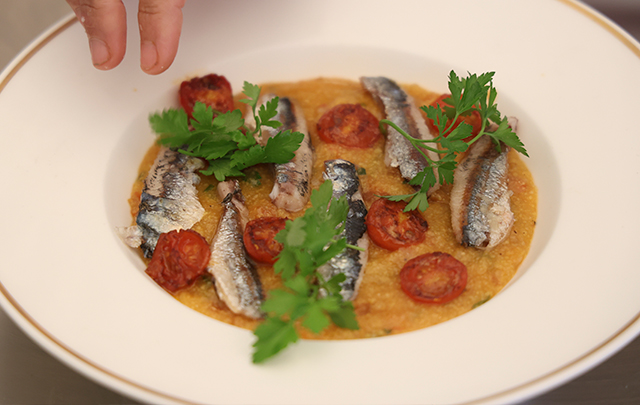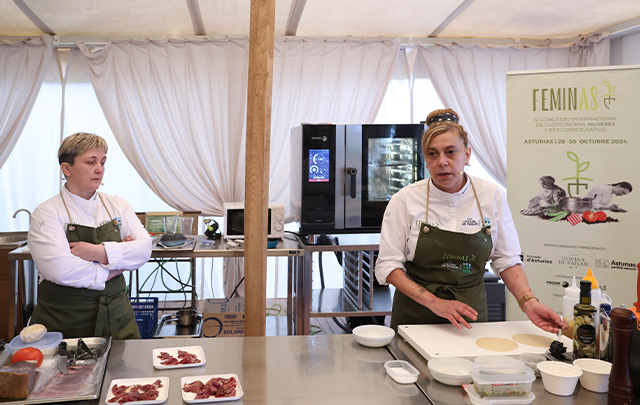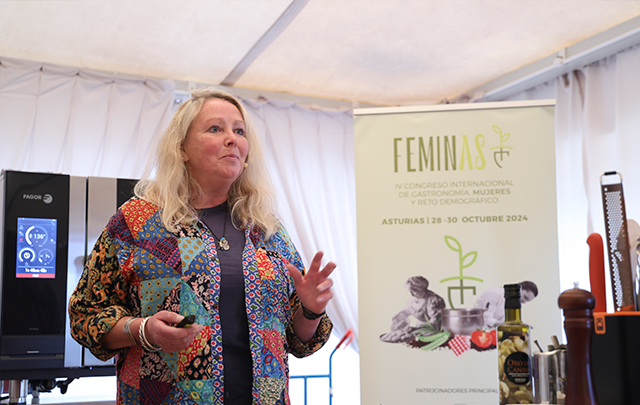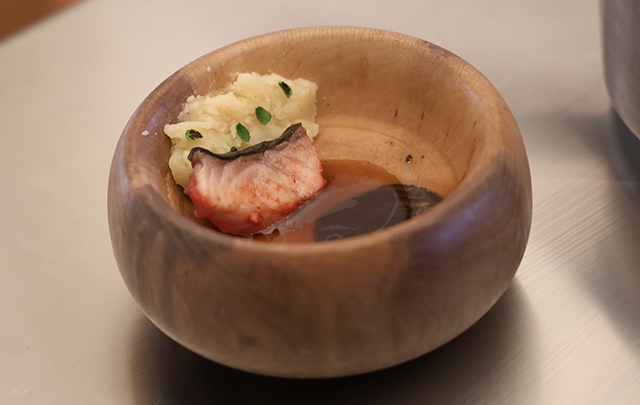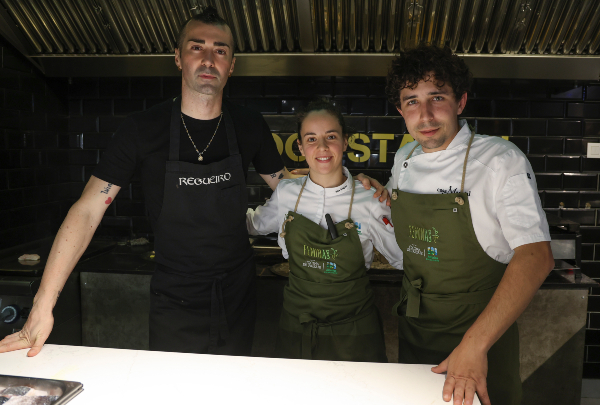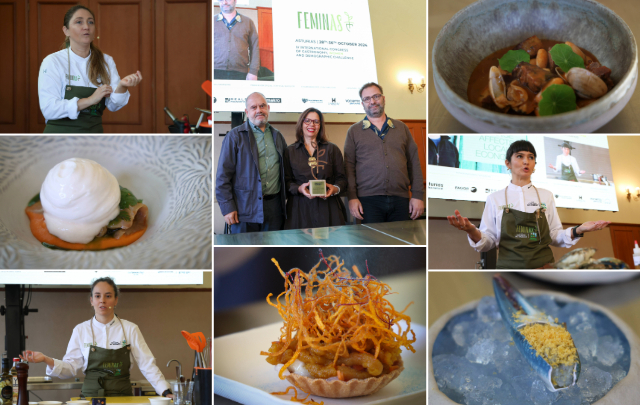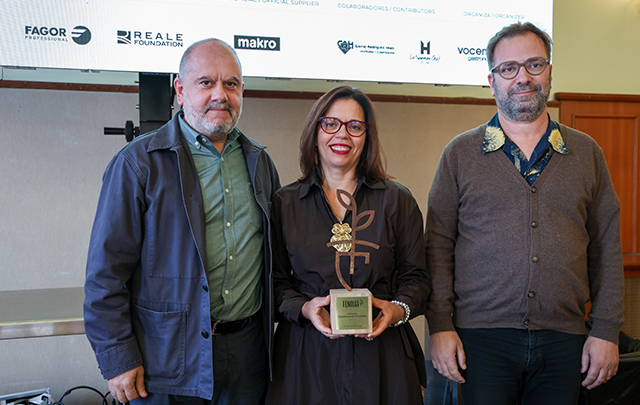News
Women's recipe for the demographic challenge: cuisines that draw on the past but look to the future
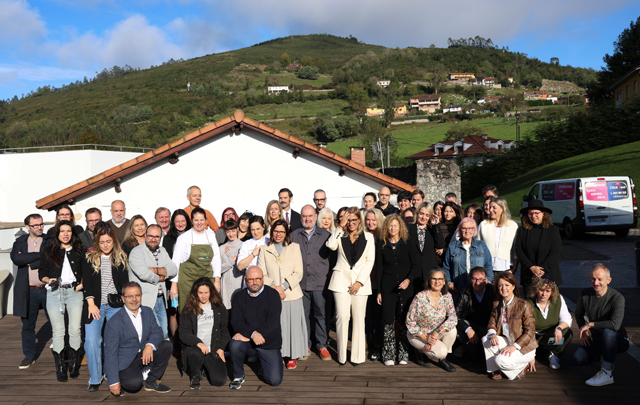
Hunting, shepherding, the forest and small producers are the protagonists of the first day of the 4th International Congress on Women, Gastronomy and the Demographic Challenge, set in the western Asturian region.
Several successful projects carried out by women in the world of cheese show that it is necessary to give value to a quality handcrafted product in order to continue its production.
Western Asturias will host the fourth edition of FéminAs, the International Conference on Women, Gastronomy and the Demographic Challenge, an event that is consolidating itself as a platform for the recognition and empowerment of women in gastronomy. In this edition, the presentations and debates will focus on how the gastronomy sector can contribute to the population in rural areas. The first day of the congress, sponsored by the Government of Asturias through Asturias, Cocina de Paisaje and Asturias, Paraíso Natural, was held at the Hotel Las Caldas, near Oviedo, the capital of the Principality and a city renowned for the quality of its restaurants, its legendary patisseries and its cider bars. At the opening ceremony, the director of the congress, Benjamín Lana, described Asturias as "a land of hospitality, scenery, landscapes and good food". Lana recalled how, five years ago, FéminAs set out to become a meeting place "to share experiences and make visible the work of women and how the future of rural areas rests on their shoulders". This year, representatives from Scotland, Portugal, Italy, Croatia and different areas of Spain are taking part.
The Principality's Vice-Minister for Tourism, Lara Martínez, stressed that FéminAs 'makes Asturias a symbol of gastronomy from a gender perspective and with a commitment to the environment'. Martínez invited speakers and journalists to 'discover the jewels of the west coast and Oviedo'. On the demographic challenge, she recalled that "in Asturias, around 80% of the population lives in urban centres, but the most famous restaurants are spread throughout the whole of Asturias".
The presentations began with a speech by Elena Lucas, the third-generation chef at the La Lobita restaurant in the village of Navaleno (700 inhabitants) in Soria. Lucas, the chef at the restaurant, which has now been awarded a Michelin star, said that her inspiration came from memory and the environment. Our cuisine draws from the past but looks to the future,' she said.
The chef, who was born in Soria, offered a demonstration of seven dishes, six of which were traditional preparations, from escabeche, which was once used as a preservative, to tripe, pepitoria, ajo carretero, a stew made by transhumant shepherds from sheep's meat, hake in batter, and honey with green pine cones, which her elders used to cure colds.
She incorporates all these recipes, but with one major change: the substitution of meat and fish as the main ingredients with various seasonal mushrooms gathered in the surrounding forest, because the other pillar of La Lobita is the absolute link with the local pantry and the season. I even like to go to the forest to collect my own ingredients," explains the chef.
Also from Castile, in this case Valladolid, came Lydia del Olmo, the soul of the Ceibe* restaurant, who gave a talk entitled 'Ceibe, culture, tradition and territory'. Although she practises free cuisine (which is the Galician name for her restaurant), she made a strong plea for Galician products. We must put an end to the false Galician modesty and value the product, giving it the importance it deserves, as well as the small producers, because Galicia has everything," she said. This is exactly what she does in her restaurant, in collaboration with local producers.
Scallops from Cambados, hake and pork offal, naturally combined with local vegetables and legumes, were the main ingredients of the dishes she cooked for the public. In keeping with his philosophy of freedom and openness, she suggested that the sweet cocido roll he prepared, "between Castilian and Galician", should be paired with a glass of cocido broth made with "the umami of Galicia".
Spain is not the only country affected by the rural exodus and the demographic challenge. This was confirmed by the Malaysian-Scottish chef and broadcaster, Julie Swee-Lin McLeod, who, together with Roberta Hall McCarron, one of Scotland's most outstanding chefs, co-owner and chef of The Little Chartroom, gave a talk entitled 'Hunting, gastronomy and the demographic challenge'.
For decades, more and more people have been moving to Glasgow and Edinburgh from other parts of Scotland," said McLeod. Roberta Hall, who spoke to her colleague and broadcaster via video conference from her restaurant, explained her commitment to game cooking because "it is now a sector that employs a lot of people in rural areas and generates a lot of wealth and great economic benefits, but it also provides us with meat of exceptional quality that is very much in demand. We pay £25 for a partridge,' she said.
For Hall and McLeod, the visibility now enjoyed by professional chefs should be used to influence consumers. In Scotland we have an enviable larder of sea, forest and land and a great culinary tradition. Cooking our produce and showcasing our food culture is a great way to support rural people and stop the population decline in this environment,' said Hall.
The day concluded with an interesting debate on how the consumption of quality cheeses can not only contribute to the enjoyment of consumers, but also to the preservation of the natural environment and the prevention of forest fires. On one condition: that grazing and extensive livestock farming are encouraged. Michelle Buster, founder of Forever Cheese, the leading importer of European cheeses in the USA. and winner of the Food from Spain Award at San Sebastian Gastronomika 2023, was in charge of moderating the round table 'The fight against rural depopulation from the world of cheese', with the participation of Carmela Cano of Queso Galmesán (Arzúa, A Coruña), Martina Pernar, President of the Paski Sir Producers Association of Croatia, and Natasha Soares of the União de Cooperativas Agrícolas de Lacticínios de São Jorge (Portugal).
It is important to value not only the product, but also what is behind it: the land and, above all, the people," said Michelle Buster. Carmela Cano, who described herself as a 'rural entrepreneur', illustrated Buster's words with her own experience in the production of Galmesán cheese, the Galician version of Parmesan: 'We make it thanks to the work of 27 small, extensive livestock farmers, and we make a product whose uniqueness lies in the fact that it speaks of its territory, because we only use local ingredients'.
For Martina Pernar, the key is also to convince young people to get involved in the countryside and preserve the industry, but "it's very complicated because other sectors, such as tourism in our case, are more attractive to them because they earn more money and the work is not so hard," she argues. Martina is the manager of Paska Sirana, a company that produces the exclusive Paški sir PDO. This is a 100% sheep's milk cheese that can only be produced on the island of Pag on the Adriatic coast, which has put its territory on the world map.
In the same vein, Natasha Soares, Quality Manager for São Jorge Pio cheese, produced on the tiny Portuguese island of São Jorge, added that it was essential to "combine tradition with progress" and to defend the countryside to the utmost. For this reason, she believes that "the government should encourage producers, but also promote crafts in schools".


